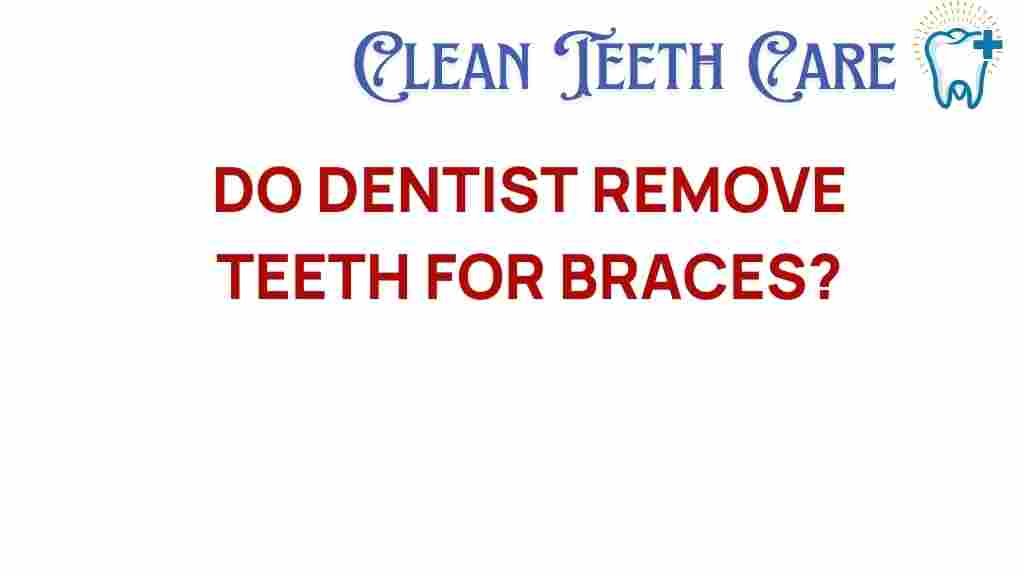Do Dentists Really Extract Teeth for Braces? Understanding the Role of Teeth Extraction in Orthodontics
If you’re considering braces for your smile transformation, you might have come across the term “teeth extraction” and wondered about its implications for your orthodontic treatment. The decision to extract teeth during orthodontic treatment is a significant one and can impact your overall dental care, oral health, and patient experience. In this article, we’ll unpack the truth about teeth extraction and its necessity in the world of braces and orthodontics.
Why Extraction Might Be Necessary
One of the primary reasons dentists consider teeth extraction is to create space in the mouth. When you have overcrowded teeth, there may not be enough room to align them properly. Here are some common scenarios where teeth extraction may be recommended:
- Overcrowding: If your teeth are too big for your jaw or if there’s not enough space, extraction may help.
- Misalignment: Teeth that are severely misaligned might require extractions to achieve the desired results.
- Impacted Teeth: Wisdom teeth or other impacted teeth can create complications and may need to be removed.
- Facial Aesthetics: In some cases, dentists might suggest extractions to improve facial balance and aesthetics.
The Role of an Orthodontist
Orthodontists are specialists in diagnosing and treating dental irregularities. When you visit an orthodontist for braces, they will assess your oral health and design a personalized treatment plan. This assessment often includes:
- A thorough examination of your teeth and jaws.
- X-rays to understand the position of your teeth and roots.
- 3D imaging to plan your treatment effectively.
Step-by-Step Process: When Teeth Extraction is Recommended
Understanding the process can alleviate concerns about teeth extraction and braces. Here’s a step-by-step guide on what to expect:
1. Initial Consultation
During your first visit, the orthodontist will examine your teeth and discuss your goals for treatment.
2. Treatment Planning
If extraction is deemed necessary, the orthodontist will explain why it’s important for your specific case.
3. Extraction Procedure
The extraction is typically performed by a dentist or an oral surgeon. Here’s what to expect:
- Local anesthesia will be administered to minimize discomfort.
- The tooth will be carefully extracted, and you will receive aftercare instructions.
4. Braces Installation
Once you’ve healed from the extraction, your orthodontist will install your braces.
5. Regular Check-ups
Throughout your treatment, you’ll have regular check-ups to monitor progress and make any necessary adjustments.
Common Concerns About Teeth Extraction
Many patients have concerns regarding the extraction of teeth for braces. Here are some common questions:
Will Extraction Affect My Smile?
The goal of extraction is to enhance your smile transformation. With proper orthodontic treatment, the final outcome will likely lead to a more symmetrical and pleasing smile.
Is Extraction Painful?
The extraction process is performed under anesthesia, so you shouldn’t feel pain during the procedure. Post-operative discomfort can usually be managed with over-the-counter pain relievers.
What If I’m Anxious About the Procedure?
It’s completely normal to feel anxious about dental procedures. Communicate with your orthodontist about your concerns; they may offer sedation options to help you feel more comfortable.
Alternatives to Teeth Extraction
Not all cases require teeth extraction. Here are some alternative treatment options that your orthodontist may consider:
- Expansion Devices: These can help widen the dental arch, creating more space for teeth.
- Clear Aligners: These are removable and can sometimes provide a less invasive method for alignment.
- Partial Braces: In some instances, braces can be applied only to certain areas without the need for extraction.
Aftercare Following Extraction
After a tooth extraction, proper aftercare is crucial for healing. Here are some tips:
- Follow Post-operative Instructions: Your dentist will provide specific aftercare instructions to follow.
- Manage Pain: Take prescribed medications or over-the-counter pain relievers as directed.
- Maintain Oral Hygiene: Keep your mouth clean, but avoid vigorous rinsing or brushing around the extraction site for the first few days.
Conclusion: Making Informed Decisions About Your Orthodontic Treatment
Ultimately, the decision to extract teeth for braces is a nuanced one, influenced by various factors including the severity of misalignment, oral health, and the desired outcome of your treatment. It’s essential to have open discussions with your orthodontist about your treatment options and any concerns you may have.
Teeth extraction, when necessary, can be a vital step towards achieving a healthy, beautiful smile. If you’re considering braces or want to learn more about your orthodontic options, don’t hesitate to schedule a consultation with a qualified orthodontist today.
For more information on dental care and orthodontic treatments, visit this resource.
Your journey to a radiant smile is filled with choices, and understanding the role of teeth extraction in braces can empower you to make informed decisions for your oral health.
This article is in the category Treatments and created by CleanTeethCare Team
